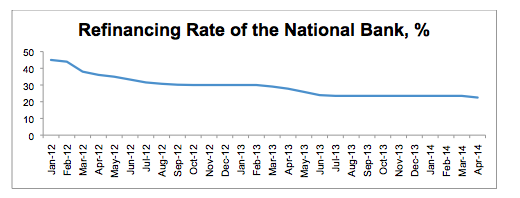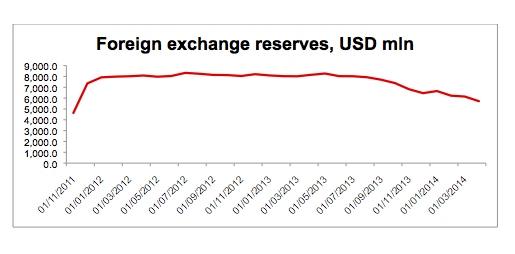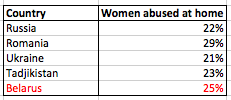National Bank Reduces Refinancing Rate – Belarus Economy Digest

This April the National Bank decided to its reduce refinancing rate, which has remained unchanged for the past 10-months. This measure is, to some degree, a helping hand for the real sector that is facing significant difficulties at present. However, despite their best intentions, this move may actually lead to serious imbalances and create additional pressure on the national currency.
Unfortunately, there are still no signs of improvement for the Belarusian economy. Its reduced foreign exchange reserves, the ongoing consequences of the potash conflict with Russia, and difficulties with accessing external financing support all have the authorities turning its attention back towards privatisation.
However, despite the potential sale of state property, the government has to reconsider how it goes about supporting and motivating its state enterprises. Evidence of the authorities' continued inefficient use of its budgetary revenues are one of the first places they should look.
Changes in Refinancing Rate
In the beginning of April the National Bank of Belarus (NBB) announced its decision to reduce the refinancing rate by one percentage point. Thus, beginning April 16 the rate has been set at 22.5% while previously it was anchored at 23.5% over the past 10 months. The reasons for this rate reduction is raising some concern amongst experts, largely due to Belarus' rather high inflation rates.
Moreover, the IMF, in its latest World Economic Outlook, expressed expectations that the annual inflation in Belarus will hit a mark of about 16.3% in 2014, which is even higher than the figure in its 2013 forecast (15.5%).
There are a few possible reasons for the NBB lowering the refinancing rate. A reduction of the refinancing rate will decrease credit rates, which makes access to financing for the real sector easier.
This will likely stimulate the economy and accelerate economic growth. However, at the same time, this measure can destabilise the nation's financial sector through an outflow of national currency deposits and put additional pressure on the Belarusian ruble. Therefore, a reduction in the refinancing rate forces the National Bank to monitor the situation in the market even more closely in order not to make it any worse.

Reduction of Foreign Exchange Reserves and Obstacles with External Financing
In March, the foreign exchange reserves of Belarus dropped by $429m (USD) and at the beginning of April they totaled $5.715bn, which is the lowest level they have seen since November 2011. Since the beginning of 2014 a 14.1% reduction in the nation's reserves has occurred, which is around $936m.
These kinds of negative trends are the result of the government's payments on its external debt servicing, a deterioration in the situation with foreign trade and its attempts to control fluctuations, or at least minimise their effects, on the currency market. At the same time there was practically no inflow of foreign currency into Belarus' economy.
Belaruskali, which is one of the main suppliers of foreign currency to Belarus, keeps facing problems and continues to suffer the consequences of its falling out with Uralkali. According to its report on profits and losses, there was a significant drop in all key indicators of its operations. For instance, its net income dropped 4.9 times in 2013 compared to 2012.
In order to improve the company’s position, in the beginning of April the authorities extended its zero rate for export duties on potash fertilisers until the end of 2014. The introduction of a zero export rate first occurred in September 2013 as an act of support and guarantee for the enterprise’s sustainability. Extension of these preferential export conditions will likely help to stabilise and improve Belaruskali's position, taking into account that there are finally signs of market recovery.

With limited access to foreign currency, the authorities have been forced to announce the sale of certain state assets. In the beginning of April the State Property Committee made public a list of shares for sale as well as whole state-owned assets. The list consists of 87 state enterprises and includes the sale of an equity interest in the Mozyr oil refinery plant.
Before that Belarus expressed its desire to sell all of its shares in the Mozyr refinery plant. Today’s revised plan assumes a sale of around 30% of its shares and the state holding onto 25%. There is no clear information available about its price. But taking into account that a preliminary evaluation of the enterprise’s value amounted to $4bn, it can be expected that requested price will be around $1bn.
Another possible source of external financing can come in the form of another loan from Russia. On April 10, 2013 the Council of Ministers of Belarus approved an agreement with the government of the Russian Federation on the allocation of financial credit. However, there has been no precise information made public regarding the amount, timing and terms of the line of credit yet.
Changes in the Treatment of State Enterprises
Financial limitations, combined with unsatisfactory economic results, are forcing the authorities to change the way they subsidise state-owned enterprises. The low level of efficiency of how the state allocates its budgetary resources is one key reason for reforming its current model of providing support.
Beginning in 2016 a new mechanism for state support will implement several changes. First, a number of instruments of support, such as budgetary loans, will be no longer available. Second, it is likely that the lion's share of state financial support will be done using a traditional bank lending system, where enterprises will be responsible for paying interest on its loans. Third, the long-standing 'personal approach' towards specific state enterprises will also cease to exist.
Therefore, it looks like the available channels of support will become considerably more narrow and enterprises will need to find other ways of maintaining their operations and increasing their efficiency. Change could come in many forms, including the restructuring of dated, inefficient enterprises. Those unable to adapt, however, may well just go bankrupt.
Maryia Akulava, Belarusian Economic Research and Outreach Center (BEROC)
This article is a part of a joint project between Belarus Digest and Belarusian Economic Research and Outreach Center (BEROC)





